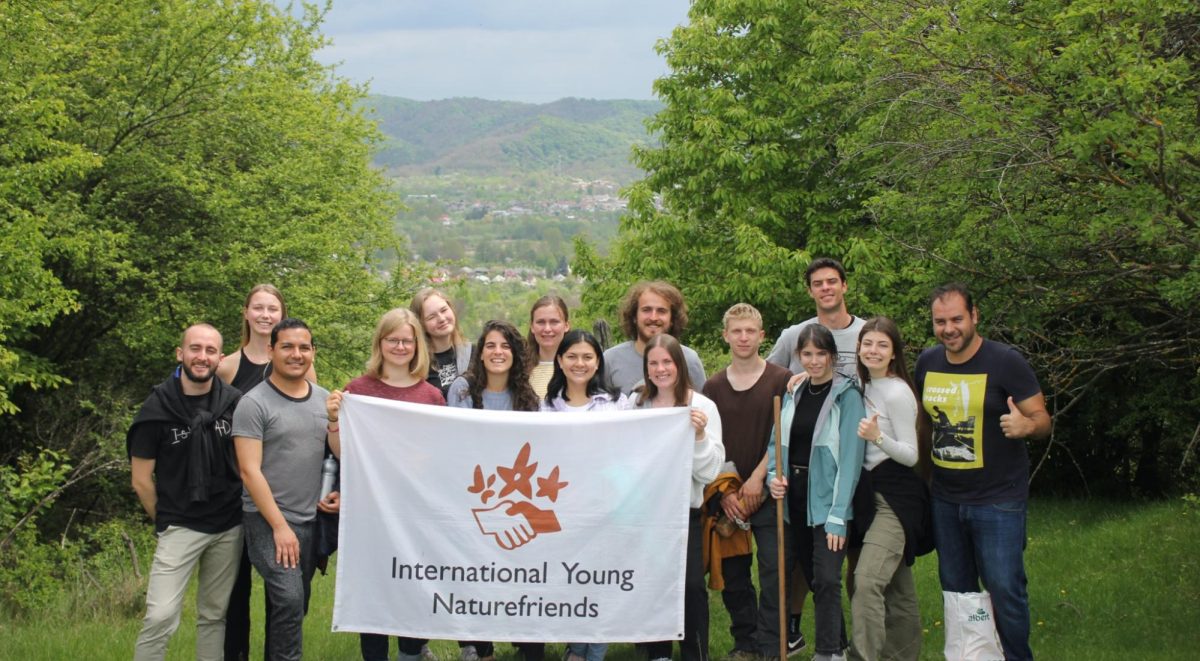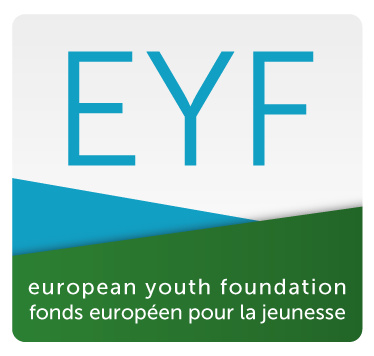
This year’s cycle “Let’s Get Outta Here, Outdoor Education as the Path to Mental Health” moved into a small village in Romania for its second activity. This training course called “Outdoor Education Advisors for Mental Health of Youth” lasted for a full five days and delivered amazing results in such a short time.
During these days, the participants created a toolkit to use when working with youth or sharing it with their contacts in other organizations. Being in the countryside of Romania surrounded by cows, pigs, horses, and nature was a great touch, which showed the importance of using nature when improving your mental health. During the week, we had participants from several different countries working together to reach a common goal, creating a toolkit linking outdoor education to the mental health of young people.

Amalie – Intern
After starting as an intern at International Young Naturefriends one week before the event in Romania, I was thrown into this new world of outdoor education, toolkits, mental health, and youth activities. I didn’t have a lot of expectations before traveling to Romania, but I’m left with a lot of positive memories and eye-opening experiences. The participants I met while working on the project were all motivated, and everyone had an interesting story and path. I found a lot of inspiration from hearing about their personal projects and their eagerness to help youth better their mental health.
During the sessions, one emphasized that mental health is a positive term, which is sometimes confused with mental illness. Also, the fact without reflection, it’s just an experience, which shows the importance of taking a step back and reflecting on what you have learned, seen, and experienced to learn more and have the maximum benefits from an experience. We also touched upon the seven C’s of resilience which became the base of our toolkit. Each activity included in the tool strengthens at least one of these.

As for the product we created, I’m very proud to have been part of the process, and I believe the toolkit which helps strengthen the resilience of youth will be an easy and valuable tool in the future. We created a deck of cards with different categories such as icebreakers, main activities, and reflections; all were activities to strengthen traits such as confidence or control. The tool’s design makes it easy to use and bring with you and more interactive than, for example, a book, which I like.
One of the impressions that will stay with me was, for example, the difference between doing an activity on top of a mountain in the forest or in a playground. The positive effect of nature and its importance for our mental health can sometimes be forgotten during our hectic lives participating in zoom calls and working on the computer. The fact that we focused on the link between outdoor education and mental health was important. Sometimes experiencing it is more impactful than being told so.
Overall I’m excited to see the toolkit in person, share it with my network, and see our work’s effect on the youth. My first experience participating in such events has given me a lot of motivation to seek new and similar experiences and opened my eyes to how nature is essential and can be used to better our mental health.

Maja – European Solidarity Corps Volunteer
Being only two weeks into my European Solidarity Corps volunteering term at IYNF, I had mixed feelings about the then upcoming training course. I was both excited for the new and promising experience and filled with mild anxiety about being the part of the organizing team for the first time. Apart from having expectations of the training I also set personal goals for myself to reach as a team member. Now that I look back on the wonderful five days I spent working with my team and being a part of one of the most inspiring groups I have seen so far, I am happy to say that my expectations were exceeded and that I managed to fulfill the standards I set for myself during this activity.
The beginnings did not seem as promising, though. The night before the start of the activity I felt really ill and ended up having very little sleep. As a result, on the very first day of the activity I was slow and sluggish and had trouble focusing. I felt like I was not setting a great example for the participants and my spirits dropped significantly. What got me back on track was the amazing environment that I was lucky enough to be in: the rest of the team and their support, our approachable and relaxed trainer, the wonderful hosts and their amazing food as well as our cooperative and cheerful participants.

The activity itself turned out to be a unique mixture of different experiences for me. I soon realized that it was so easy to be hardworking in such a supportive and tranquil setting. Most of our activities were outdoors and we even ventured a short hike up the hill to witness the charming view of the venue and surrounding houses and hills from above. This hike and the game we played at the top of the hill were the team-building activities we needed to prepare for the task that was at hand, which was to create a first aid toolkit for outdoor education which is supposed to promote mental health in young people.
I am still at a loss for words when it comes to the process of the creation of the toolkit. All the teams came together in perfect harmony and we had the basic outline of both the content and the design after just one afternoon of work. Seeing positive results so soon made me, and I assume everyone else, even more motivated to make this toolkit a success by the end of the week. It was such an inspiring experience for me. The teams were working at different locations: some in the working room, some in the dining room and some lying in the grass with their laptops and phones. I was a part of the design team but I never felt separated from the rest of the group. We were all online at the same time and we could see each other writing and editing the documents. Seeing everyone work together and use their skills and talents in this particular way was something I have not witnessed before.

The natural setting and the relaxing free time also played a great part. I wanted to document as much of the activity as I could by taking pictures and videos, which is why I ended up observing a lot more of my surroundings than I normally would have. I also observed the other participants and the way they worked and spent their leisure time. I got to witness a couple of amazing personal stories which reminded me of the importance of mental health and what we are trying to achieve with this toolkit, as well as nature and health in general. Seeing the nature, the animals, the clear sky and listening to the participants and their experiences, I felt the urge to look within, reflect and explore myself and the way I connect to people and communicate.

The highlight for me was still the amazing group of participants, who were all not only motivated and hardworking, but also very talented and insightful. None of this would have been possible without their cooperation, dedication to the topic and interest in mental health, and their desire to contribute. Every day was fun and productive and it did not require much effort because it was a natural response to the safe space we created for ourselves. This activity became a personal achievement for me because of their amazing energy and hard work.
Even though the five days of the activity are over, I will carry this experience with me for a long time. We also have another task ahead of us which is to publish and promote the toolkit we invested so much energy in. I do not think I can be more happy with the outcome of the activity and my first ever training course experience with IYNF. I am really motivated to make the rest of my volunteering year follow the pattern of these first couple of weeks as a Young Naturefriend at the secretariat in Prague.
This activity was kindly supported by the European Youth Foundation of the Council of Europe.


